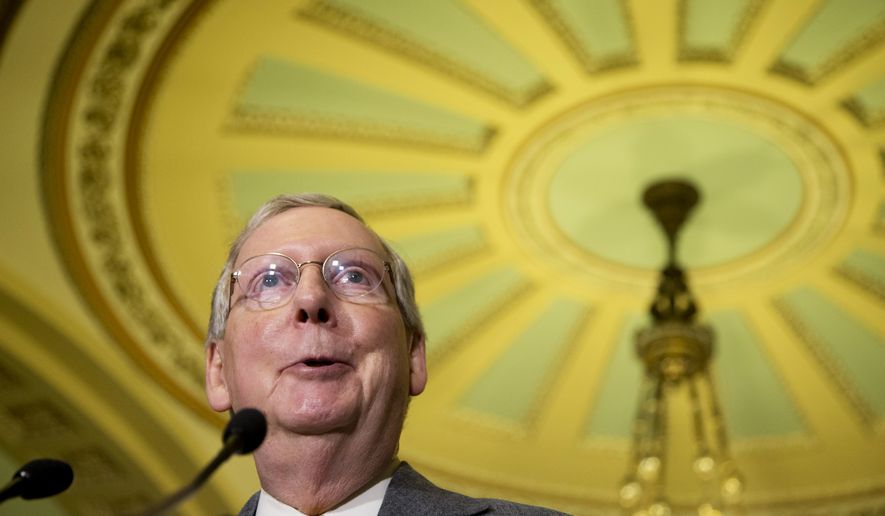The Senate rallied late Tuesday to pass a landmark Medicare overhaul that locks in doctors’ rates while requiring wealthier seniors to pay more, erasing an awkward ritual in which Congress ignored scheduled provider cuts each year without funding a permanent fix.
President Obama was expected to sign the bill, elating doctors who had faced a 21 percent pay cut Wednesday because the administration had to begin processing this month’s claims.
The bill repeals a 1997 payment formula that lawmakers repeatedly papered over — even when it called for a cut — and replaces it with an annual 0.5 percent raise for five years as Medicare shifts to a reimbursement program that rewards or penalizes doctors for their performance.
“It’s a solution to a broken Medicare payment system that has vexed congressional leaders of both parties literally for years,” said Senate Majority Leader Mitch McConnell, Kentucky Republican.
The bipartisan package also funds the Children’s Health Insurance Program for two more years and provides money for community health centers.
The Senate approved the bill on a 92-8 vote after staying late to vote on six amendments in quick succession, defeating each of them. All eight dissenters were conservative Republicans, including presidential hopefuls Ted Cruz of Texas and Marco Rubio of Florida.
That was a relief for Republican leaders who wanted to foster an open debate process but didn’t want to return the bill to the House, which passed the measure last month with 392 votes.
House Speaker John A. Boehner, Ohio Republican, said he didn’t plan to revisit the bill he brokered with Minority Leader Nancy Pelosi, California Democrat, placing pressure on senators to approve the bill without changes.
Deficit hawks, though, said the bill marked a return to reckless fiscal policy, tacking $141 billion onto the deficit over the next 10 years just weeks after Senate Republicans heralded their balanced budget.
“Do you want to know how a country goes broke?” said Sen. Jeff Sessions, Alabama Republican. “It’s managing money this way.”
Republican leaders acknowledged that the bipartisan bill, which received 392 votes in the House, was not perfect. But they pointed to phased-in savings in later years, as wealthier members of the nation’s aging population contribute more to the government health care program.
“Like any large bill, it’s a mixed bag in some respects, but I think on the whole it’s a bill well worth supporting,” Mr. McConnell said.
Among Republican-led amendments, Sen. Mike Lee of Utah tried and failed to apply budget rules to the bill, which would have meant that all of the $141 billion eventually would have to be funded by tax increases or spending cuts elsewhere.
Sen. Tom Cotton of Arkansas failed to persuade many senators to replace the law’s “value based payments” for doctors with a regular pay raise, while Sen. John Cornyn of Texas sought to pay for the bill by repealing Obamacare’s individual mandate.
Neither man could persuade any Democrats to support his amendment, which doomed them because they would need 60 votes to pass.
Senate Democrats tried — and failed — to fund the Children’s Health Insurance Program for four years instead of two, to remove Medicare’s annual caps on physical, speech and occupational therapies, and to bolster women’s health funding, including loosening abortion funding regulations.
Even so, they lauded the bill’s goal of making the health care system more predictable for doctors and seniors.
“I think that this day will be remembered for making a very important contribution in the history of Medicare,” said Sen. Ron Wyden, Oregon Democrat.
• Tom Howell Jr. can be reached at thowell@washingtontimes.com.




Please read our comment policy before commenting.